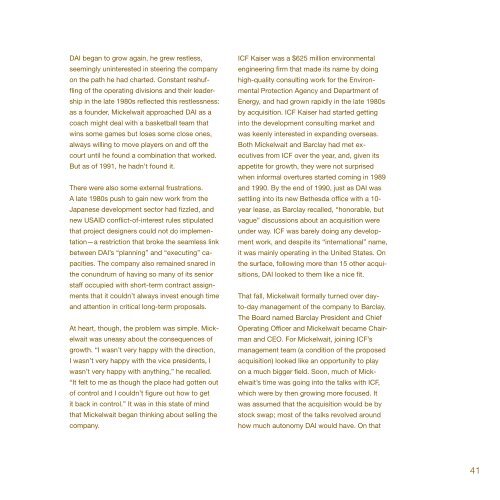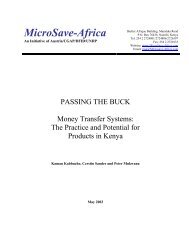Create successful ePaper yourself
Turn your PDF publications into a flip-book with our unique Google optimized e-Paper software.
<strong>DAI</strong> began to grow again, he grew restless,<br />
seemingly uninterested in steering the company<br />
on the path he had charted. Constant reshuffling<br />
<strong>of</strong> the operating divisions and their leadership<br />
in the late 1980s reflected this restlessness:<br />
as a founder, Mickelwait approached <strong>DAI</strong> as a<br />
coach might deal with a basketball team that<br />
wins some games but loses some close ones,<br />
always willing to move players on and <strong>of</strong>f the<br />
court until he found a combination that worked.<br />
But as <strong>of</strong> 1991, he hadn’t found it.<br />
There were also some external frustrations.<br />
A late 1980s push to gain new work from the<br />
Japanese development sector had fizzled, and<br />
new USAID conflict-<strong>of</strong>-interest rules stipulated<br />
that project designers could not do implementation—a<br />
restriction that broke the seamless link<br />
between <strong>DAI</strong>’s “planning” and “executing” capacities.<br />
The company also remained snared in<br />
the conundrum <strong>of</strong> having so many <strong>of</strong> its senior<br />
staff occupied with short-term contract assignments<br />
that it couldn’t always invest enough time<br />
and attention in critical long-term proposals.<br />
At heart, though, the problem was simple. Mickelwait<br />
was uneasy about the consequences <strong>of</strong><br />
growth. “I wasn’t very happy with the direction,<br />
I wasn’t very happy with the vice presidents, I<br />
wasn’t very happy with anything,” he recalled.<br />
“It felt to me as though the place had gotten out<br />
<strong>of</strong> control and I couldn’t figure out how to get<br />
it back in control.” It was in this state <strong>of</strong> mind<br />
that Mickelwait began thinking about selling the<br />
company.<br />
ICF Kaiser was a $625 million environmental<br />
engineering firm that made its name by doing<br />
high-quality consulting work for the Environmental<br />
Protection Agency and Department <strong>of</strong><br />
Energy, and had grown rapidly in the late 1980s<br />
by acquisition. ICF Kaiser had started getting<br />
into the development consulting market and<br />
was keenly interested in expanding overseas.<br />
Both Mickelwait and Barclay had met executives<br />
from ICF over the year, and, given its<br />
appetite for growth, they were not surprised<br />
when informal overtures started coming in 1989<br />
and 1990. By the end <strong>of</strong> 1990, just as <strong>DAI</strong> was<br />
settling into its new Bethesda <strong>of</strong>fice with a 10year<br />
lease, as Barclay recalled, “honorable, but<br />
vague” discussions about an acquisition were<br />
under way. ICF was barely doing any development<br />
work, and despite its “international” name,<br />
it was mainly operating in the United States. On<br />
the surface, following more than 15 other acquisitions,<br />
<strong>DAI</strong> looked to them like a nice fit.<br />
That fall, Mickelwait formally turned over dayto-day<br />
management <strong>of</strong> the company to Barclay.<br />
The Board named Barclay President and Chief<br />
Operating Officer and Mickelwait became Chairman<br />
and CEO. For Mickelwait, joining ICF’s<br />
management team (a condition <strong>of</strong> the proposed<br />
acquisition) looked like an opportunity to play<br />
on a much bigger field. Soon, much <strong>of</strong> Mickelwait’s<br />
time was going into the talks with ICF,<br />
which were by then growing more focused. It<br />
was assumed that the acquisition would be by<br />
stock swap; most <strong>of</strong> the talks revolved around<br />
how much autonomy <strong>DAI</strong> would have. On that<br />
41



